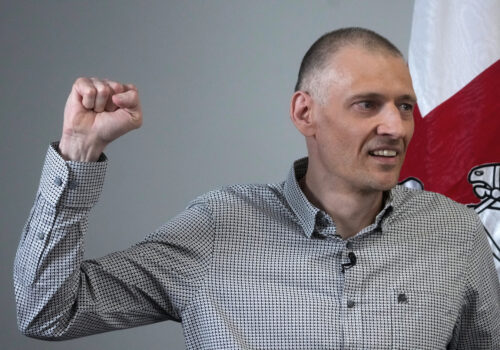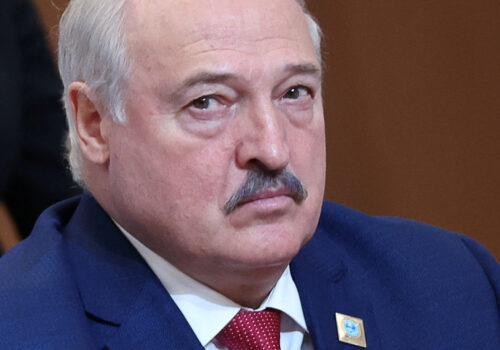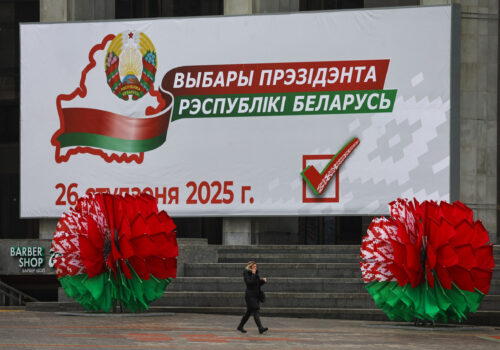Lukashenka’s succession game: Promises, power, and the illusion of an exit
In an interview with Time magazine published earlier this month, Belarusian autocrat Alyaksandr Lukashenka declared that he has no intention of running for the presidency in the future. Some might wonder if Lukashenka, who has held onto power since 1994 through several fraudulent elections, seriously means it. For most Belarusians, however, such claims carry little weight. Over the past three decades of his rule, he’s said this dozens of times.
This latest declaration, however, comes amid Lukashenka’s broader efforts to reshape his international image. In the past few months, he has managed to make himself relevant by drawing interest from Washington in his role as an intermediary with Russian President Vladimir Putin. Lukashenka has been selling the idea that he knows Putin better than most world leaders, having dealt with him for years. Backchannel communication through Lukashenka, for instance, played a role in making this month’s Alaska summit between Putin and US President Donald Trump possible. In this context, Lukashenka, who is currently under US and European Union sanctions, is likely to say anything that he believes will make him appear more palatable to Washington and Brussels, especially with the prospect of sanctions relief as a reward for his role as a middleman.
So, how should Lukashenka’s comments suggesting this might be his final term in office be viewed?
A history of broken promises
After Lukashenka “won” the contested vote in 2020—which sparked massive protests fueled by allegations of fraud and repression—he made statements promising constitutional changes, including the redistribution of presidential powers. He also indicated that he would not run for office again, and he pledged to pave the way for his successor, declaring that constitutional reforms would reduce presidential powers and shift the country’s political system toward a parliamentary republic. This did not happen. Notably, it was Lukashenka himself who unilaterally expanded presidential powers, eliminating the two-term limit for the president from the Belarusian constitution in 2004.
In 2022, Lukashenka attempted a “plan B”: He amended the constitution to give the All-Belarusian People’s Assembly—a body designed to gather government officials, local leaders, and selected citizens to discuss and approve key policies—broad but vaguely defined powers, while granting himself personal immunity. This would have allowed him to step down from the presidency but retain real influence behind the scenes. On paper, he could still use this mechanism, but in practice the idea appears to have been shelved.
Fast forward to the 2025 presidential election, held in January: Lukashenka once again engineered a “victory,” claiming more than 86 percent of the vote. The absurdity of the situation was perhaps best captured by a Communist Party “spoiler candidate,” Siarhei Syrankou, who campaigned under the slogan: “I’m not running against Alyaksandr Lukashenka—I’m running with him.”
The succession question
Regardless of his ever-changing declarations, one thing is certain: Lukashenka, who is seventy years old, will not stay in power forever.
There are a few possible scenarios for his succession.
A common theory is that his youngest son, Nikolai, also known as Kolya, is being groomed for leadership. From a young age, Kolya has been a constant presence at high-profile events—attending military drills, observing official meetings, and even accompanying his father in his meeting with Pope Francis in 2016. In a recent interview, Lukashenka preemptively addressed questions about dynastic succession, insisting that Kolya, who is now twenty years old, would be “offended” by any suggestion that he might take over.
Still, Kolya’s image has been carefully curated. At times, pro-government Belarusian TikTok creators portrayed him as a “crush,” while Russian media dubbed him “the crush of all the Rus,” raising questions about whether this popularity is genuine or part of a broader public relations strategy to make him appear likable and relatable.
What truly matters, however, is not whether Lukashenka wants his son to take power, but whether Kolya could withstand rivals with stronger ambitions. Lukashenka might build some infrastructure around Kolya to support a future role for his youngest son, but that does not guarantee success.
Another potential candidate is Viktar Lukashenka, the president’s eldest son. Viktar rarely draws much attention as a contender for future president, but his senior positions and experience suggest that he has political ambitions. While most public and media focus remains on Kolya, Viktar holds key roles, having served as national security advisor to the president and a member of the Security Council, as well as holding an informal supervisory position over Belarus security forces. Currently, he serves as the head of the Belarusian Olympic Committee. Though this shift might appear like a career pivot, it is far from a retirement. He continues to be engaged in security-related activities, including providing special units to the Gulf sultanates to train their law enforcement agencies and participating in certain local operations conducted under the flags of Persian Gulf countries. In addition, he oversees diplomatic and trade relations with the United Arab Emirates and other countries in the region in various roles—sometimes as an official envoy, sometimes informally. For example, he has reportedly been involved in discussions about establishing a hub for Belarusian trade in Oman.
According to BelPol, an organization of Belarusian security officers who have defected to the democratic forces, Lukashenka primarily trusts three people: his eldest two sons and his longtime fixer Viktar Sheiman. Some earlier reports suggested that he listens to his press secretary Natalia Eismont, his youngest son Kolya, and his eldest son Viktar. According to sources with knowledge of the family whom I have spoken with, Lukashenka’s middle son, Dzmitry, is the least interested in politics among his family members. And when it comes to choosing whom to rely on, Lukashenka tends to lean more toward his longtime friend Sheiman than his son Viktar, perhaps reflecting some uncertainty about Viktar’s loyalty.
These hints from insiders are not verifiable, and they should therefore be considered with a pinch of doubt. While provisional, they nonetheless may prove useful to map against the actions Lukashenka does take going forward.
If any member of the family does succeed Lukashenka, Viktar seems to be the most plausible figure to watch, given the information on hand. But if no family member steps in—or if the Lukashenka family loses its grip on power—another possibility is that Belarus’s authoritarian elite orchestrates the transition. In Mafia-style systems like that of Belarus, power doesn’t change hands through elections but through elite bargaining. In the event of an elite-driven transition, it likely won’t matter much who the new figure is—whether it’s the prime minister or someone else from the nomenklatura—as long as they serve the existing power structure.
The Russia factor
The Kremlin will be monitoring this transition carefully, which could unfold along two main trajectories.
The first trajectory is that Moscow accepts Lukashenka’s chosen successor—whether that is one of the autocrat’s sons or a newcomer from the nomenklatura. In this scenario, Russia would essentially endorse the outcome of the Belarusian regime’s internal process, as long as the successor remains loyal to the Kremlin.
The second trajectory is more radical: The Kremlin could bypass Minsk’s internal arrangements and install its own candidate—someone explicitly pro-Russian and largely disconnected from Belarusian realities. That someone would have to hold Belarusian citizenship and go through a facade of the electoral process—or perhaps a brutal takeover along the lines of the one carried out by the “little green men” in Crimea.
Discussions about “closer integration” or even potential annexation often follow such scenarios, but these are largely parallel issues. Belarus is already deeply integrated with Russia, to the point that it is often unclear whether foreign policy decisions are made independently or under Kremlin pressure. Indeed, it is unclear whether the Russian military presence in Belarus reflects Lukashenka’s own security calculations or his inability to resist Moscow’s influence.
The fact that Belarus remains a formally independent state today—and hasn’t been annexed by Russia—is less a credit to Lukashenka and more a result of Kremlin calculations. The Belarusian army wouldn’t stand a chance against Russia, and the West would likely not respond harshly to the annexation of what is already a Kremlin satellite. At this point, it is more beneficial for Moscow to keep Belarus under control but maintain the appearance of independence.
Still, despite overwhelming Russian political influence, any openly pro-Russian figure would struggle to gain traction domestically in Belarus. The Kremlin has already tested the waters. In the past, Russia has reportedly attempted to cultivate support for pro-Russian political parties in Belarus, only to quietly abandon the idea, in part because support among Belarusians simply wasn’t there. What Belarusians want, consistently and clearly, is independence and neutrality—a sentiment that has shown up again and again in public opinion polls. Surveys conducted by different institutions in the past dozen years show that while a minority (usually less than 10 percent) does favor full political integration with Russia, a strong majority of Belarusians prefers friendly relations without unification.
The exiled opposition’s chances
This brings us to the opposition in exile. Lukashenka’s 2022 constitutional amendments stipulate that only candidates who have lived continuously in Belarus for the past twenty years may run for president—a rule designed to exclude exiled politicians from the race. Yet this is not an insurmountable obstacle. Belarusians could unite around an alternative candidate, someone who champions a democratic agenda rather than the regime’s plans. That candidate might be a leader already inside the country, perhaps someone currently out of the public eye or recently released from prison, or a new figure who emerges over time. Alternatively, Belarusians could rally around a protest candidate, as happened in the 2020 election when Sviatlana Tsikhanouskaya stepped in during the election in 2020, after the other leading opposition candidates of that time, including her husband, were jailed.
The Kremlin looms large over Belarus’s future
Looking ahead, the experience of 2020 offers some important lessons. During the protests, there were signals that some officials within the regime supported change. Among the defectors and those condemning the regime’s violence were diplomats resigning in protest, security and law enforcement officers, and even former Prime Minister Sergei Rumas. These are the publicly known instances, and they alone do not indicate the existence of a critical mass within the regime willing or able to negotiate. Nevertheless, they suggest that the system is not monolithic, and the opposition could potentially negotiate power-sharing arrangements or guarantees if free and fair elections were allowed.
In other words, a democratic transition might be possible through an internal process involving parts of the existing system.
However, the biggest obstacle remains Moscow. In 2020, democratic forces attempted to establish contact with the Kremlin and promised constructive cooperation if Putin withdrew support from Lukashenka. But for Moscow, a democratic government in Belarus represents an unacceptable risk and a loss of control.
Many Belarusians openly dream of celebrating Lukashenka’s departure with champagne in the streets. Yet the crucial challenge for any democratic transition will remain the same: How to deal with Russia.
Katsiaryna Shmatsina is a Eurasia fellow at Lawfare, specializing in Belarus, Russia, and international security. She is a Belarusian-trained lawyer turned political analyst with over a decade of experience in Belarusian and European think tanks, serving as a researcher and, at times, as a political consultant for the Belarusian pro-democratic forces.
Further reading
Tue, Jun 24, 2025
US secures release of Belarusian prisoners but pressure must continue
UkraineAlert By Hanna Liubakova
The release of fourteen prominent Belarusian political prisoners last weekend is welcome news. But the 1172 who remain behind bars in Belarus deserve more than symbolic gestures from the West, writes Hanna Liubakova.
Wed, Jul 24, 2024
Lukashenka’s rhetoric toward Ukraine and the West has softened. His repression of Belarusians has not.
New Atlanticist By Hanna Liubakova
Lukashenka is continuing his campaign of domestic repression and targeting Belarusians in exile—including the author of this article.
Thu, Jan 23, 2025
European Parliament and United States condemn ‘sham’ Belarus vote
UkraineAlert By Mercedes Sapuppo
The European Parliament has condemned this weekend’s presidential election in Belarus as a “sham” designed to keep the country’s long-serving dictator Alyaksandr Lukashenka in power, writes Mercedes Sapuppo.
Image: Belarusian President Alexander Lukashenko attends the Eurasian Economic Forum in Minsk, Belarus June 26, 2025. Sputnik/Sergey Bobylev/Pool via REUTERS



